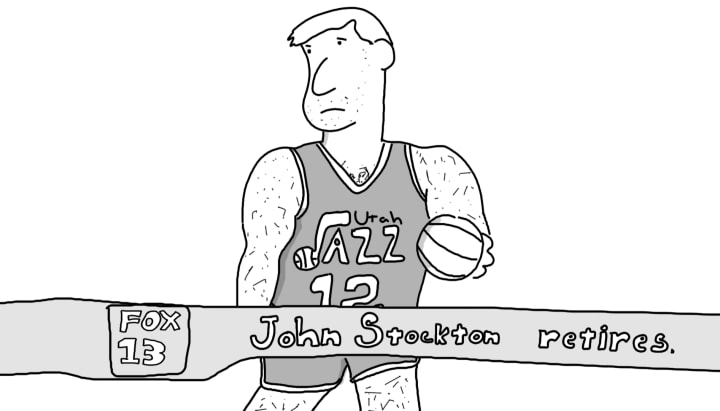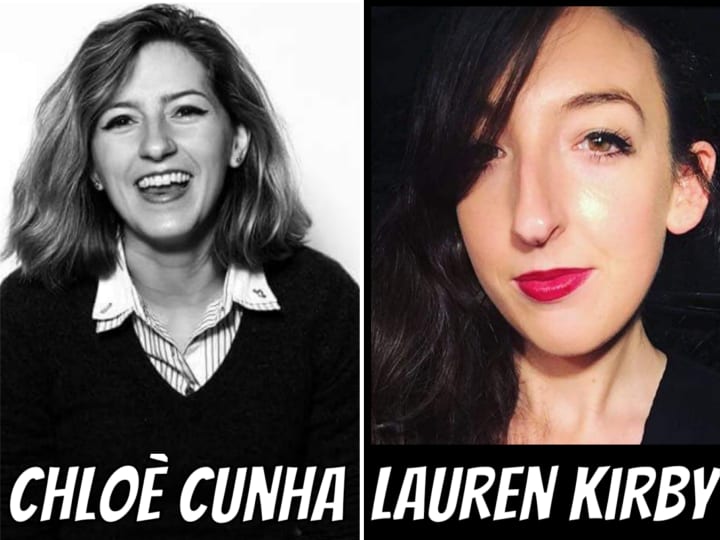So You're a Comedian? Part One
What else do you do? And why we should all branch out a bit.

So you're a comedian? What do you really do? It's the only profession that people will question. Someone could say they are a doctor and we would just be like, "Oh wow! What do you practice?" Say that you are a comedian and you are likely to be challenged immediately. There is no particular process you have to go through to become a comedian, there's no school or degree required, just hard work, and consistently bringing the funny. Let's say you're doing the work and being consistent, it is still very hard to figure out what the next level is supposed to be or how to get there.
I remember being brand new to stand-up and had no idea the amount of options for comedians and a decade later I am still amazed learning more about the different ways comedians hone their craft and avoid the monotony of "regular jobs." This article and a small series of the next few are about some of the other non-traditional jobs comedians take on to continue performing that aren't UBER, and not having to subject yourself to Bob 'the funniest guy near your desk' who always says, "I should be the comedian," or, "you can use this in your skits" or anything thing else that makes you want to punch Bob in the face.
Comedians are at all levels, but hold the same title so it can be a bit more confusing than the path to any other career. Here's a really forced analogy, but maybe one to figure out a path:
A Master Chef usually will start as a Line Cook preparing a recipe, the open mic, if you will, to see if this is what they want to do. From there you can move up to Sous Chef where you get a little more responsibility, a few showcase shows in comedy. From there some become an Executive Sous Chef, you get more time and are featuring, opening and hosting consistently. Then Executive Chef where you are headlining, you are trying to bring people in to your restaurant and then there's Master Chef where you are a name people want.
Even if you are at any executive status, chances are you'd still make more money actually cooking, but I wanted to reveal some other options in a comedians line of work that can, at the very least, be enjoyable, continue to gain exposure as a comedian and improve your performance.
Bringing the funny and it's much better than my cooking reference!

Harper Liles comedian, bass guitarist, clarenetist. Check out out more of Harper's stuff on IG. Photo credit: LadyLike Comedy
In my last article, I was speaking with comedian Kevin Gootee from Comic's Watching Comics and he brought up the fact that he was doing some voice acting on top of stand-up and producing a show on Amazon. (Click for full article).
I've heard many other comics mention dabbling in it throughout the years, but it occurred to me that I know almost nothing about it. I had the pleasure of trying to figure out a conference call (I'm secretly 90), but actual fun speaking with two multi-talented young comics that have done voice acting:
Chloé Cunha and Lauren Kirby!
I love the irony in an writing an article about using your voice.
Martin: Do you think voice acting has helped your stand up?
Cunha: I feel like comedy in some ways has helped voice acting. That's interesting though, voice acting is very specific, obviously it's in the title, and in comedy your voice plays a big factor as well. There's a visual part to stand up, but there's timing and the modulation of your voice and they feed into each other. In voice acting you have to watch your breath, nobody wants to hear you (breathes heavily into microphone).
Kirby: Definitely, I talk so fast sometimes. You're supposed to tape your set, listen to yourself, but I'm still at that point where I cringe, I can't do it yet. Voice acting you have to listen to yourself after every single take, you think you're saying something a certain way, you re-listen to it and you're like, ugh, that doesn't sound right. Which for stand up, you think you are telling a joke a certain way, but it doesn't always come out the same as it sounds in your head.
Cunha: That's so true, just thinking about the process of an audition for voice acting, you could have 30 seconds of dialogue, and it might take you hours to get that take right.
Kirby: Right?!
Martin: Really?!
Cunha: I exaggerate slightly perhaps, but sincerely, you want the perfect take for it
Kirby: Exactly, especially if you are taping from home, I just did a project for my friend who runs a company called Leonard Cartoons, he sent me a microphone, I put a blanket over my head and did it from my laptop. I think I had about 10 seconds of dialogue maybe 2 sentences and I sat there for an hour sweating under the blanket trying to get the right take.
Is that a typical audition? Just cover yourself in a blanket and hope the neighbors aren't watching? Do you send in a reel or something?
Cunha: I think it depends, sometimes you'll be lucky and your exact voice will be perfect, but most of the time you are changing your voice to some degree. I haven't done too much of it, it's funny cause I'm not exactly an expert on voice acting either, but I've done some narrative podcasts and things. Depends on the project though, some friends of mine were doing a sci- fi advice column show, very funny and they aren't comedians, it's funny writing though. I auditioned for two characters, the role I eventually got was a moody, paranoid, assassin type character, so I did a bit of a gruff almost batman-like, even though I don't sound like that at all, I was like here is my not Batman, Batman. They knew that I spoke French too, so they asked if I could do a French accent. The other was this very classic film noir, sexy, Kate Hepburn type, and I was like oh gee, I can make my voice sound like that, but it's funny because my default is like a Muppet really, so that audition took me significantly longer because I really had to try to ooze sex out of every syllable, then I had to do it with a French accent. The other audition took way less time and that's the one I got so...even though the first one was closer to my voice, it's not exactly your voice, that's part of what's tricky about it, you do want it to sound different, especially if you want to get cast in multiple things, ideally you want your voices to sound a little unique to each character.
Kirby: Interesting that you were talking about that because one of my friends wrote a book, and he's a singer, has been a singer for years, so his vocal chords are trained, the diaphragm, how he holds his breath, breathing just everything, but he said he couldn't read for the audiobook, they actually had to hire a professional audiobook voice actor because it's so strenuous and it's a completely different thing. To me I would have thought singing, you have to have so much control and making sure you are using your body correctly, or else you could hurt yourself.
Video from Leonard Cartoons in Caption

Lauren's clip is right up front, I never really thought about all the work that goes into getting it to sound perfect, worth the sweat. Check it out here.
Cunha: If you look at videos of voice actors, their faces look so weird, cause they're exaggerating every emotion because you're not gonna see their face, but you need to hear their emotions so powerfully
Kirby: Exactly. I took a class probably about 10 years ago and they said that one day you'll get an audition and when they call you back, they're gonna know if you're smiling or not, they're gonna know how you're holding your face, they're so trained, that they will know if you are just modulating your voice or if you're really in it.
Do you bring these facial expressions and act outs into your comedy?
Cunha: In some ways, you need so much energy to do that, and Lauren I can totally sympathize with hearing yourself because at first I was like ewwww, but I've been trying to record almost every set, sometimes I fu€k up and I don't or forget, but I actually got a video from a show the other day and I had this funny moment where I did notice a difference in my facial expressions from that tape than from an earlier tape, and I don't know if I could say it's directly linked to voice acting, but I was more aware of the face I was making and didn't realize I was doing that entirely. I got to see a live taping of The Penumbra Podcast which their fans lost their minds watching it, and it was really cool to see. I became a fan of it before I was even on it. My friend actually asked me to audition because she had heard my non-narrative podcast Yes Homo, just inserting that plug, please don't include that you don't have to do that.
I do what I want, Chloè.

It's a really cool podcast, sorry/not sorry, gonna plug it with a link cause the last episode of season 1 was one of my favorites. Yes Homo
Cunha: With The Penumbra Podcast I started listening because I wanted to figure out the audition, but I became a fan, and had a similar fan feeling at that live recording even though I had been in the recording booth with them on our episodes. There is such a physical element to voice acting though, obviously in this they were playing it up cause it was a live show, but at the same time, if you just isolated the audio of that it would be just as amazing.
(Recording yourself seems to be an ongoing theme, but so necessary in the development of any act. But that is a different article.)
If somebody was brand new and really wanted to get into voice acting what would be a good resource to start with?
Kirby: Community education classes or even I took a class at Boston Casting it's kind of an intensive one, might be 3-5 hours, but you get to talk to somebody who is actually on TV, you get to learn what other projects they do like us, with comedy, improv, writing, regular acting, stage acting etc. That last one I took there was awesome, they have you record something and get feedback, it's not just "Okay here all the information all at once," you get to actually taste it right there. The one I took, they would actually give you directions and be like, "Okay that was good, now do it as a sad clown." Take a class, dip your toes in, it might be the best way to make connections too. I like community education, it's easily accessible, usually cheap and you can learn a lot.
Cunha: I'm writing some of that down. Just adding to what you are saying, there are some Facebook groups out there too that post opportunities, some are paid, some are unpaid, but if you're new and you just want to try some stuff out that might be a good start. Some of it is also reaching out to creators you may like.
Kirby: There's a podcast for almost everything too. I also produce a comedy show, so I started listening to a podcast on how to produce a comedy show and got some amazing advice for it too. There's a podcast that even breaks down every aspect of making cartoons, not just the voices, but how to finance it and what not. Youtube as well, there's so much on voice acting just to watch and take it in
There's corporate comedy, club comedy, clean comedy etc, what are the different genres of voice acting?
Kirby: I was at jury duty and realized the person telling me how to do this job, that person is a voice actor. Then there's podcasting and cartoons, narrative and entertainment, so I think it's a huge range of what you can do.
CARTOOOOOOOOONS!

From Lauren's Webcomic Lonely Troll Girl
Cunha: That's a good point I think we forget how many things need a voiceover, and kind of take that for granted, but you hear something and you're like wait, someone got paid to do that, that's someone's job.
(My phone's text notification went off which is a sound from Mario Bros)
And video games!
Kirby: I would love to do video games
How do you put yourself out there as a voice actor?
Kirby: I definitely should be better about marketing myself, but interacting with the (voice acting/comedy) community you find others doing the same thing, maybe you enjoy their projects and reach out if they have a post about needing actors, or extras, or see if they can keep you in mind for a future project. I've got most my work from just word of mouth, Boston is kind of big, but I feel like it's so small at the same time and we are all sharing with each other and our friends whether it be videos, stand up, or improv.It sounds cliché to be like it's all about networking too, but I mean my friend is making a feature cartoon coming up and asked me to be on it. We started following each other on word press because we liked each other's webcomics, so it's just making those connections and this is 10 years later. Especially creative people and their projects it's great when you can work and create together.
Cunha: I think for some people, maybe the word networking sounds kind of intimidating, cause it sounds so cold and corporate. All that it is and the way to think about it honestly is just, hey, this is a friend, with similar interests and literally you are just having fun with your friends. If you really want to do this stuff, just go out, get your buddies and have fun. You fall into it way easier than you think.
Kirby: Absolutely! That's how I was when I first moved here, and started doing stand up. You make one friend, they bring you to a show, you meet another friend, then all of a sudden you're in this big group of friends and people you can reach out to like hey can you do this voice for me or can you be on my show, or can I be on your show. It doesn't feel like it's gross.
Thank You!!!!!

About the Creator
Sarah Martin
Sarah doesnt care about being some classy broad, shes from Boston. When not stealing cable from the neighbors, she has been building a name for herself with her playful and refreshing candor.
@JustSarahMartin
OthJustSarahMartin.c
Enjoyed the story? Support the Creator.
Subscribe for free to receive all their stories in your feed. You could also pledge your support or give them a one-off tip, letting them know you appreciate their work.






Comments
There are no comments for this story
Be the first to respond and start the conversation.